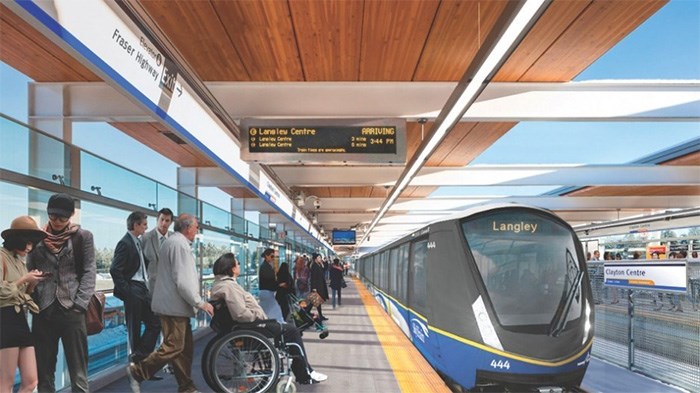Surrey taxpayers will fork over $39 million in city assets to TransLink to compensate the regional transportation authority for planning costs associated with a mothballed light-rail system that has been replaced with a planned SkyTrain extension now facing mounting financial questions due to the pandemic.
The Mayor’s Council announced Friday it had finalized the payment, which is a combination of land and cash.
In November 2018, Surrey City Council unanimously agreed to axe the Guildford-Newton LRT project in favour of a SkyTrain extension to Langley. The $1.6 billion already committed to be spent on the LRT project was transferred to constructing phase one of the $3.1 billion Surrey Langley SkyTrain (SLS) extension. Phase one will only get the line to Fleetwood, at 166 Street, with a further $1.5 billion needed to push the line to Langley City Centre.
TransLink and City of Surrey negotiated the compensation agreement in July 2019, but Friday’s report shows the details of the funds.
Surrey will hand over $11.4 million worth of for the SkyTrain extension and $5.5 million worth of dedicated road, build 300 park and ride spaces for $12.8 million and provide $9.3 million in cash.
The city’s recently released 2019 Annual Financial Statement shows $38.8 million removed from the annual surplus as non-cash charges to operations, meaning the city has yet to account for the cash portion of the payment.
The TransLink payment eats into excess revenue, which supports capital acquisitions and projects and typically contributes to statutory reserve funds. The city’s reserve funds have shrunk from $86 million in 2018 to $57 million in 2019. The city’s operating expenses in 2019 totalled $842 million.
Cost considerations have already seen four eight-figure capital projects cancelled by the current council in 18 months.
The city’s records show a further $5.4 million could be paid to TransLink if city council makes no decision to implement a rapid transit along King George Boulevard by Dec. 31, 2021.
Meanwhile, it’s now no longer certain the SLS line will proceed as once planned, or at least proceed on time.
TransLink is projecting a best-case-scenario loss of $710 million in revenue, because fewer people are taking public transit and, if they are social distancing, measures must be implemented, meaning there will be less room on buses. A 12-month period of physical distancing would see a projected loss of $1.37 billion.
The Mayor’s Council was briefed on the SLS project by Geoff Cross, TransLink’s vice-president for transportation planning and policy.
In April, the Mayor’s Council, which oversees TransLink planning, had postponed the phase two investment plan update due to the impacts of the COVID-19 pandemic. The plan was to outline the remaining investment sources (municipal/regional, provincial and federal) needed to pay the remaining $1.5 billion costs to get to Langley City Centre.
Cross hinted at going cap in hand to the feds.
“Part of what we’re seeking as the region and potentially the province with the federal government is increased federal share around capital programs. That could impact both this particular project and other capital projects,” Cross told the council Friday in an online meeting.
While Cross asserted the business case “is very solid,” his briefing note stated how COVID-19 is producing uncertainties.
“Considering the COVID-19 crisis, there are several outstanding issues that must be addressed for the SLS project to advance,” stated Cross’ brief.
“Once the longer-term economic and public health situation begins to stabilize and becomes more clear, the agency will need to reset its projected revenues and expenditures over the ten-year period, confirm available senior government funding, recapitalize its depleted reserves and re-prioritize its entire existing capital plan,” Cross noted.
Cross did not mention how the SLS business plan depends on increased ridership along the route, and ridership depends on greater residential development, which in turn is dependent on population growth, which in Metro Vancouver is fuelled largely by immigration.
He did state the plan takes a view looking outward to 2050.



